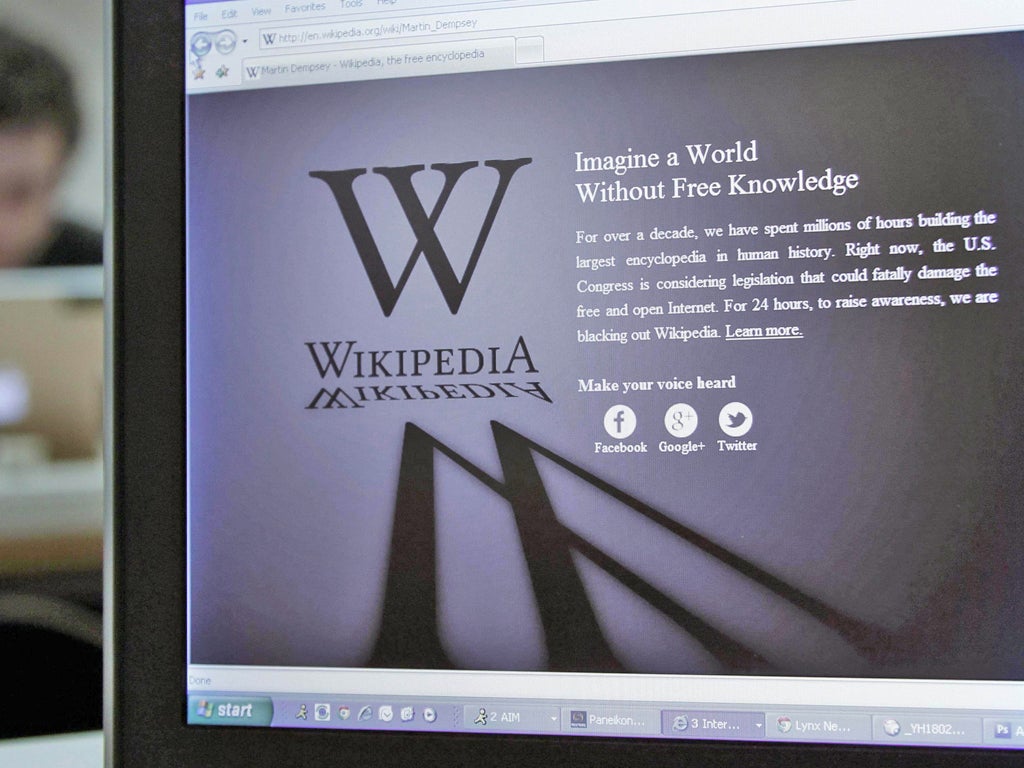Could you find Ouagadougou without Wiki?
Tim Walker on life when you can't click on your favourite reference site

If you were researching your history coursework yesterday, or, say, writing a newspaper article about Wikipedia, you would have found yourself at a loss. Instead of the largest encyclopaedia in human history, visitors to Wikipedia.org were greeted with a black page and a doom-laden invitation to "imagine a world without free knowledge".
For 24 hours, the website had gone dark, in protest at the proposed Stop Online Piracy Act, or Sopa, currently being considered by the US Congress. Wikipedia believes the law, which would stop search engines linking to websites that facilitate illegal downloading, "could fatally damage the free and open internet" by promoting censorship.
Of course, as a serious journalist, I would never normally use Wikipedia as a serious research tool. Well, I wouldn't only use Wikipedia. But in this case, it would undoubtedly have provided a semi-accurate set of facts about its own history and a decent explanation of Sopa. Without it, I was forced to turn for facts to a series of more obscure websites and – would you believe it – printed books.
Given that the i offices have had access to the internet for some time, I can reveal that all the physical encyclopedias in the building date back to before the Obama presidency. So how would I fare when I tried to complete the everyday tasks for which I normally turn to the world's favourite crowd-sourced reference tool?
I can't have been alone, for example, in using Wikipedia to remind myself of the plotlines to the original Sherlock Holmes stories, during the BBC's recent run of Sherlock. Of what was Conan Doyle's Moriarty a professor? What led Holmes and his nemesis to the top of the Riechenbach Falls?
Wikipedia is an invaluable source of information for TV viewers. How could anybody have understood Lost without it? As it turns out, the best way to refresh my memory of Holmes, using the "free knowledge" of the web, was to read it in full at the free e-book site Project Gutenberg. This kept me occupied for most of the morning.
Naturally, I spent my lunchbreak setting a pub quiz, for which Wikipedia would have been a trove of trivia. Instead, I consulted Wolfram Alpha, a "computational knowledge engine" which answers questions directly.
It's very good on geography: Burkina Faso's capital is Ouagadougou, Wolfram assures me, and its population is 1.5 million. But it's weak on literature, and fails to name Dickens' A Tale of Two Cities. And it's incomprehensible on music, so a bit of wild Googling is required to find that Lisa Stansfield topped the charts in November 1989.
What if I wanted to settle an argument with a colleague about the origins of an internet craze, such as "planking"? Instead of Wikipedia, I'm forced to turn to the considerably less reliable Urban Dictionary, which dubiously suggests that it was originally known as "Extreme Lying Down" and originated in Adelaide, Australia.
Join our commenting forum
Join thought-provoking conversations, follow other Independent readers and see their replies
Comments
Bookmark popover
Removed from bookmarks